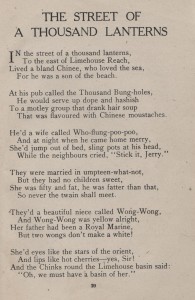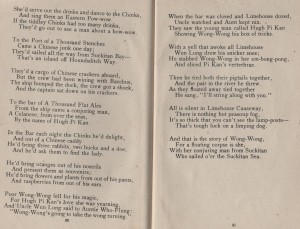Anyone recall that classic episode of Father Ted in which Ted is accused of racism after he is unwittingly caught making fun of the small Chinese community on Craggy Island? Only a decade or so earlier it had been acceptable to call the Chinese ‘chinks ‘ or ‘slitty-eyed’ and remark on their skin colour and droopy moustaches. Further back still, Sax Rohmer became a best-selling author with his tales of the criminal Dr Fu Manchu and Music hall artistes made jokes about opium dens, Chinese laundries and the white slave trade.
One of these artistes was Billy Bennett, who worked the halls from 1919 until his death in 1942. One of his specialities was to recite ‘ burlesque monologues ‘ –not only on the stage but also on radio—and some of the texts of these were published in booklet form for use, presumably, to keep up morale during the early years of the Second World War. These monologues were liberally laden with double entendre and barely disguised racist slurs that would prevent them from being performed today. One of the more gratuitously offensive,‘ The Street of a Thousand Lanterns’, had a Chinese theme:

Just a year after Bennett had taken to the stage some very different Chinese- associated verse appeared. These were verse celebrations of the Chinese community by the London-born poet and short story writer Thomas Burke who, under the persona of a Chinese shopkeeper from London’s Limehouse, published The Song Book of Quong Lee in 1920. Composed at about the same time that Eliot was writing about London in The Waste Land, Burke’s verse libre sometimes reminds me of certain passages in this great work. Indeed, I am not the only person to feel that Burke is seriously underestimated as a writer. Judge for yourself:
Making a Feast.
Ho ! Friends and enemies of Pennyfields,
A feast is spread, and you are all invited.
Many tides have risen and retired
Since I left the fervid skies of my own country
For the thin skies and leaden streets of the West.
Long have I sojourned, seeking my desire,
Keeping my shop, and always looking with long eyes
At others’ guesting-tables, at whose top sat love.
From my cold corner
I have watched their feast of fondness, and my heart has flown away,
And has beaten like a lost bird at their windows,
And none would let him in .
But now, O honourables,
My window is alight, my room is warned,
The table is set and the places are laid, and Love waits to greet you.
[RR]
